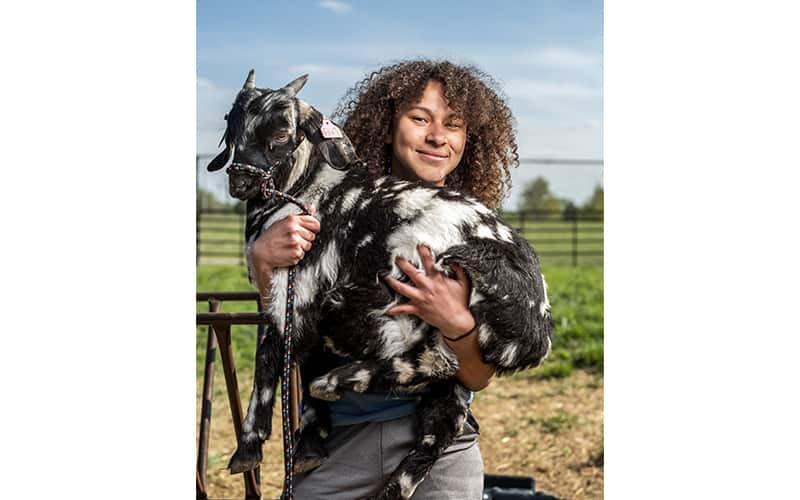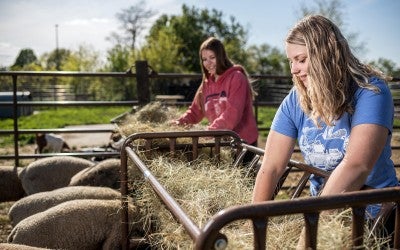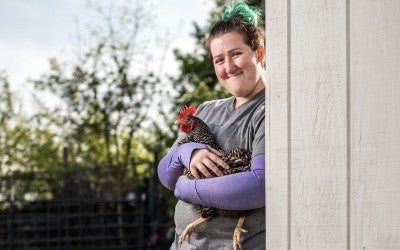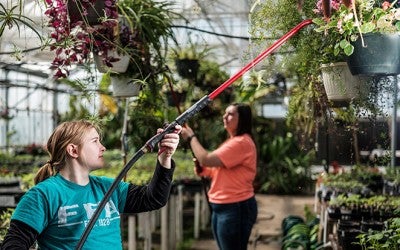
A leader in grain production and home to innovators such as John Deere, Corteva Agriscience, Kemin Industries, the World Food Prize, FarmHer and more, Iowa is deep-seated in agriculture and rural experiences. While FFA in Iowa has commonly focused on rural communities, the trend today is urban. With new chapters in some of the state’s largest cities and a significant growth in the Des Moines FFA (within the state’s largest population center at 645,000), the FFA tenets of leadership and career development are resonating with urban youth.
Within the past year and into the coming year, seven chapters have started or will start in some of the largest schools in the state, including Sioux City and Ames. “Ag education interest in Iowa in our population centers is encouraging,” says Iowa FFA Association Executive Director Scott Johnson. In the past decade, FFA membership has grown 30 percent in the state, says Johnson, with current participation at 16,000.
What draws urban students to take agriculture classes and become FFA members? The reasons are as varied as the students, but, in most cases, the opportunity to learn about land and livestock inside the city limits is too interesting and accessible to pass up.
Diverse Ag Experiences
 In the Des Moines FFA Chapter (a female-majority group that is one-third ethnic minorities), the focus is preparing the next generation of geneticists, veterinarians, scientists and more through hands-on learning. The chapter, which began in 1975, has seen consistent growth over the past four years. “Because our members don’t come from farm backgrounds,” says FFA advisor and animal science teacher Kevin Anderson, “we’re not heavy into traditional production agriculture.” Those lessons are taught, though.
In the Des Moines FFA Chapter (a female-majority group that is one-third ethnic minorities), the focus is preparing the next generation of geneticists, veterinarians, scientists and more through hands-on learning. The chapter, which began in 1975, has seen consistent growth over the past four years. “Because our members don’t come from farm backgrounds,” says FFA advisor and animal science teacher Kevin Anderson, “we’re not heavy into traditional production agriculture.” Those lessons are taught, though.
Ag education students come from seven area high schools to study current issues in the state and beyond. “We participate very much in nontraditional events,” says Anderson, who is an FFA alumnus from central Iowa. Recent science fair projects at the city and state levels had members researching cognitive abilities in bonobos (the renowned Ape Cognition and Conservation Initiative is located nearby and studies bonobos), tracking consumer greenhouse trends, making a wind turbine to check energy output and analyzing egg nutritional values. A winter 2020 competition had members exploring the complexities of the cattle industry through role-playing as a grower, environmentalist, fast-food franchise owner and low-income mother. Meetups with state legislators and Iowa’s governor, Kim Reynolds, provide opportunities for chapter members to discuss current issues and develop communication skills. Horse-judging competitions offer additional growth opportunities.
During their monthly meetings, FFA members talk about activities, competitions, legislative symposiums, swine and egg judging and more. “We come together to grow relationships; we all have to be informed,” says chapter reporter Emma Ashton. Passionate about photography, Ashton is currently working on a visual look book for her chapter to inspire city youth about agriculture. She’s also researching the ways fire affects the safety of animals at zoos and conservation centers through a World Food Prize junior competition.
 Members looking for traditional farming experiences can find those through the program too. In 2020, 45% of FFA members here raised animals, including sheep, goats, chickens and rabbits. “We do from birth to finish,” Anderson says. “Kids get to see every step of the animal.” Last year, member and current high school senior James Hughes won the Grand Champion Laying Bird, a barred rock breed. This year, Ashton raised a meat goat kid for the fair. It was her second year showing animals.
Members looking for traditional farming experiences can find those through the program too. In 2020, 45% of FFA members here raised animals, including sheep, goats, chickens and rabbits. “We do from birth to finish,” Anderson says. “Kids get to see every step of the animal.” Last year, member and current high school senior James Hughes won the Grand Champion Laying Bird, a barred rock breed. This year, Ashton raised a meat goat kid for the fair. It was her second year showing animals.
Members also have an opportunity for community outreach with their animals and through volunteerism through the Des Moines FFA Chapter.
At a local grocery store last fall, several FFA members promoted pork grown by area youth by handing out samples,cookbooks and meat thermometers from the Iowa Pork producers. The students who raised the pigs donated one to a local food bank; the remaining 11 pigs were sold at a local grocery.
Members have also packaged dry food for Meals from the Heartland, which serves lower-income residents throughout the nation and across the globe, and they have made fleece blankets for the city’s Ronald McDonald House.
“Through the FFA program, students saw what they liked and were able to create more experiences for themselves,” says senior and first-year member Eva Button.
Buzzing With Life
 The Des Moines FFA Chapter is available through the Des Moines Public Schools’ Environmental & Agricultural Sciences Academy. Students from five Des Moines schools and two suburban schools bus each day to an 11-acre farm on the city’s south side to attend horticulture and animal science classes.
The Des Moines FFA Chapter is available through the Des Moines Public Schools’ Environmental & Agricultural Sciences Academy. Students from five Des Moines schools and two suburban schools bus each day to an 11-acre farm on the city’s south side to attend horticulture and animal science classes.
The ag facility buzzes with life. Free-range chickens greet visitors with their inquisitive looks; ewes poke heads through the fence while lambs trail behind; bees hover among fruit trees as they pollinate; and greenhouses brim with tomato and pepper seedlings and annuals blooming in the hottest colors. A new animal science building houses aquaculture tanks for raising tilapia. A greenhouse gives students experiences with hydroponics and allows them to harvest greens and cucumbers for salad days prepared during class. Students spend time handling animals (including mucking out stalls), transplanting seedlings in the greenhouse, testing soil samples and identifying trees in the nearby woods.
Internships with local businesses, such as turf management at a golf course adjacent to the ag facility, give students additional hands-on opportunities. Additionally, students working and volunteering in ag- and food-related jobs, such as grocery stores and the zoo, can gain college credit for their efforts. Many Des Moines FFA members pursue agricultural jobs due to their experience.
“I’ve always had a passion for horses. I wanted to be an equine vet,” says Ashton, noting it’s difficult to find large animal specialists in the city. “I decided to broaden the spectrum,” she adds, to work with more than horses. “The classes helped me solidify that I want to go into the ag career path.” For Button, it was her passion for plants that piqued her interest in the academy and FFA. Based on her work potting poinsettias, cloning plants, making cuttings and maintaining the hydroponic system, she is planning a career in plant genetics and attending Iowa State University in the fall.
Ag In Action
Both the horticulture and animal science departments through the Des Moines Public Schools’ Environmental & Agricultural Sciences Academy give students real-life opportunities to run businesses. Each spring, the FFA plant sale raises about $75,000. All the proceeds stay in the ag education department and provide student enrichment. In 2019, second-year students were awarded a free trip to Thailand.
As part of their curriculum, students learn the science behind the plants they grow and identification basics. Most years, they work the sales floor, helping customers with their selections. This year, due to the COVID-19 pandemic, horticulture and environmental science teacher Craig Nelson worked with adult volunteers on a drive-up and virtual sale.
Later in the year, a small on-site, student-run grocery store will sell pork, lamb, chickens, honey and more produced at the urban farm. The students are responsible for setting up the store, including hours, pricing and staffing. The store will also feature goods made by students of other Des Moines Public Schools career training programs, including T-shirts created by graphic design students and signs fabricated by the welding class. A local business, Fareway Meat & Grocery, contributed $30,000 for the store and is serving as a model for the store setup.











